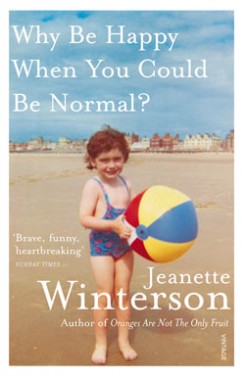Why Be Happy When You Could Be Normal
Tags Adoption Homosexuality
- Author: Jeanette Winterson
- Year of publication: 2013
- Publisher: Grove Press
- Fiction / non: Non-fiction
- Recent / classic: Recent release
- Primary Category: Autobiography
- Additional categories: Autobiography, Memoir
This book would appeal to you if
you have ever felt marginalised or misunderstood.
You probably wouldn't like this book if
you believe homosexuality is a sin.
The key themes of this book are
Growing up feeling different
Adoption
Coming out — including coming out to your parents
The power of literature
The impact of love
Growing up with difficult parents and way this can impact your development of self and your life.
The writing style is
luminous. Jeanette Winterson’s prose is lucid and descriptive, her observations persipacious, her candour bold.This book is recommended as therapy because
the eloquence and perceptiveness of the writing and the ideas draws you in completely, enabling you to see what she sees, feel what she feels, understand what she understands. Experiencing another person’s reality in this way deepens your appreciation for experiences you may not have had, but that you have now shared.
The intended audience for this book is
could be people who identify as gay or who are adopted, but I would argue that it has extremely broad appeal, especially for anyone who has felt marginalised or has difficult parents.
Quotes
‘But I try to understand how life works — and why some people cope better than others with adversity — I come back to something to do with saying yes to life, which is love of life, however inadequate, and love for the self, however found. Not in the me-first way that is the opposite of life and love, but with a salmon-like determination to swim upstream, however choppy upstream is, because this is your stream … ‘
‘When I’m with her I am happy. Just happy.’
She nodded. She seemed to understand and I thought, really, for that second, that she would change her mind, that we would talk, that we would be on the same side of the glass wall. I waited.
She said, ‘Why be happy when you could be normal?’
‘I began to realise that I had company. Writers are often exiles, outsiders, runaways and castaways. These writers were my friends. Every book was a message in a bottle
Open it.’
‘Reading things that are relevant to the facts of your life is of limited value. The facts are, after all, only the facts, and the yearning passionate part of yourself will not be met there … The wider we read the freer we become. Emily Dickinson barely left her homestead in Amherst, Massachusetts, but when we read, ‘My life stood — a loaded gun’ we know we have met an imagination that will detonate life, not decorate it.’

